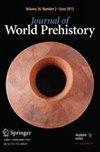The Danube Corridor Hypothesis and the Carpathian Basin: Geological, Environmental and Archaeological Approaches to Characterizing Aurignacian Dynamics
IF 3.1
1区 历史学
Q1 ANTHROPOLOGY
引用次数: 34
Abstract
Early Upper Paleolithic sites in the Danube catchment have been put forward as evidence that the river was an important conduit for modern humans during their initial settlement of Europe. Central to this model is the Carpathian Basin, a region covering most of the Middle Danube. As the archaeological record of this region is still poorly understood, this paper aims to provide a contextual assessment of the Carpathian Basin’s geological and paleoenvironmental archives, starting with the late Upper Pleistocene. Subsequently, it compiles early Upper Paleolithic data from the region to provide a synchronic appraisal of the Aurignacian archaeological evidence. It then uses this data to test whether the relative absence of early Upper Paleolithic sites is obscured by a taphonomic bias. Finally, it reviews current knowledge of the Carpathian Basin’s archaeological record and concludes that, while it cannot reject the Danube corridor hypothesis, further (geo)archaeological work is required to understand the link between the Carpathian Basin and Central and Southeastern Europe.多瑙河走廊假说与喀尔巴阡盆地:表征奥日尼亚期动力学的地质、环境和考古方法
旧石器时代晚期的多瑙河流域遗址被认为是现代人类最初在欧洲定居时的重要通道。该模型的中心是喀尔巴阡盆地,该地区覆盖了多瑙河中部的大部分地区。由于该地区的考古记录仍然知之甚少,本文旨在从上更新世晚期开始,对喀尔巴阡盆地的地质和古环境档案进行背景评估。随后,它收集了该地区早期旧石器时代晚期的数据,以提供对奥里尼亚纪考古证据的共时性评估。然后,它使用这些数据来测试旧石器时代早期晚期遗址的相对缺失是否被埋藏学偏见所掩盖。最后,本文回顾了目前对喀尔巴阡盆地考古记录的了解,并得出结论,虽然不能拒绝多瑙河走廊假说,但需要进一步的(地理)考古工作来了解喀尔巴阡盆地与中欧和东南欧之间的联系。
本文章由计算机程序翻译,如有差异,请以英文原文为准。
求助全文
约1分钟内获得全文
求助全文
来源期刊

Journal of World Prehistory
Multiple-
CiteScore
5.30
自引率
0.00%
发文量
8
期刊介绍:
Aims and scopeJournal of World Prehistory is an international forum for the publication of peer-reviewed, original treatments of the prehistory of an area or larger region. It was founded nearly thirty years ago with the remit of providing researchers, instructors and students with timely and authoritative research syntheses from all fields of archaeology. Journal of World Prehistory continues to lead in this field. Our classic articles may be 20,000 or 25,000 words long, as appropriate (excluding their extensive bibliographies). Since 2008 they have been joined by shorter (around 10,000 words), position pieces, which provide in-depth, thoughtful development of data and concepts, including interventions in controversies that unfold in our pages. These, written in a fashion interesting and accessible to all archaeologists, are often paired with a longer treatment in a single volume. In addition, readers now benefit from thematic special issues and double issues, in which a number of leading authors deal with a key theme in world prehistory, such as the origins of metallurgy (2009, volumes 22: 3 and 4), or the East Asian Neolithic (2013, in preparation). All papers are available first online, followed by the print edition. We aim to be truly global in coverage, with recent articles dealing, inter alia, with Amazonian lithics, the late Jomon of Hokkaido, the Bronze Age in Southeast Asia, the Neanderthal settlement of Doggerland, Neolithic networks in Western Asia, younger Dryas Paleo-Indian adaptations, and state formation in the Horn of Africa. Articles benefit from multi-language abstracts where appropriate, and we work closely with authors who do not have English as a first language to present major syntheses in a clear and concise way to an international audience. Traditionally, JWP focuses on earlier periods, but it includes the beginnings and early development of complex societies, and our understanding of ‘prehistory’ is broad and inclusive: for guidance on chronological scope, as well as our calendrical conventions, see the editorial article ‘Prehistory vs. Archaeology: terms of Engagement’ http://www.springerlink.com/content/346142p032604447/ Our unique remit means that we do not encourage the submission of unsolicited papers; rather, specific proposals are encouraged and then guided prior to independent peer review. Our aims and the way we fulfil them, with close contact with authors throughout the publication process, mean that JWP is not a venue for the simple and rapid dissemination of new results. Whilst we expect scholarship to be current, with syntheses including much new data, our readers look to us for definitive area/period coverage that will have continuing value.If you are proposing an article or special theme for Journal of World Prehistory, please read the Instructions for authors.Rated ''A'' in the European Reference Index for the Humanities (ERIH)?Journal of World Prehistory is rated ''A'' in the ERIH, a new reference index that aims to help evenly access the scientific quality of Humanities research output. For more information visit http://www.esf.org/research-areas/humanities/activities/research-infrastructures.htmlRated ''A'' in the Australian Research Council Humanities and Creative Arts Journal List. For more information, visit: http://www.arc.gov.au/era/journal_list_dev.htm
 求助内容:
求助内容: 应助结果提醒方式:
应助结果提醒方式:


